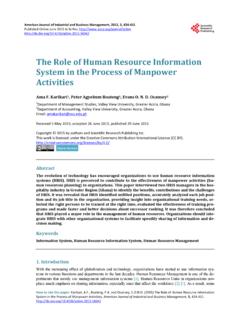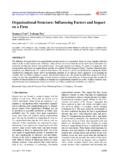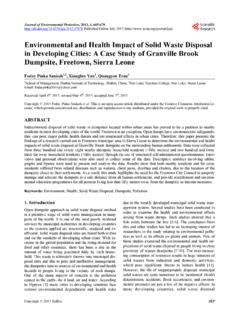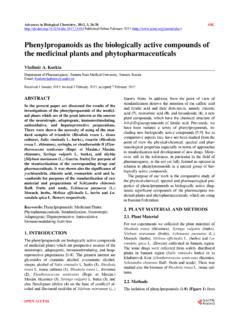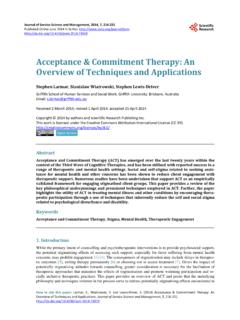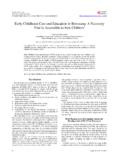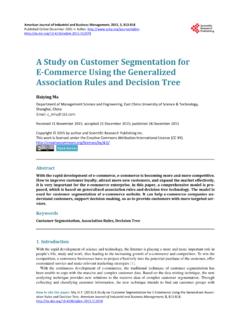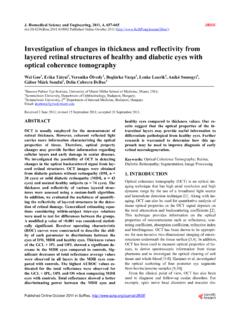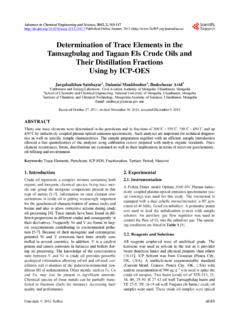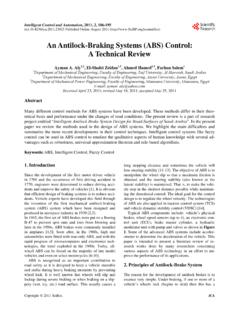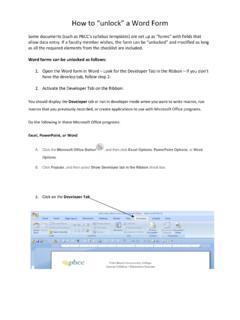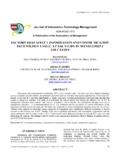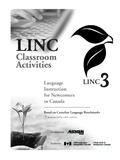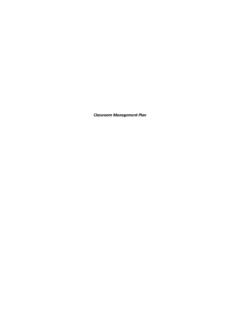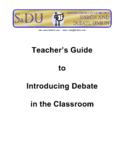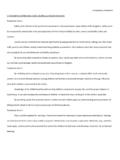Transcription of Foucault s Discourse and Power: Implications for ...
1 Open Journal of Philosophy 2013. , , 23-28 Published Online February 2013 in SciRes ( ) Copyright 2013 SciRes. 23 Foucault s Discourse and Power: Implications for Instructionist classroom Management Victor Pitsoe, Moeketsi Letseka Department of Educational Leadership and Management, College of Education, University of South Africa, Pretoria, South Africa Email: Received October 23rd, 2012; revised November 27th, 2012; accepted December 8th, 2012 This article picks up on Foucault s radical reconceptualisation of concept power , and presents a signifi- cant challenge to contemporary discourses surrounding instructionist classroom management. We critique his approach to instructionist classroom management on the basis that it conceptualises power as domina- tion in dealing with disruption in the classroom .
2 We argue that power and Discourse are interrelated con- structs that the teacher uses to perpetuate Taylorism, Fordism and bureaucratic domination in an instruc- tionist classroom setting. Drawing on Foucault s and Bourdieu s works, this document reviews: 1) ex- plores Foucault s theory of Discourse ; 2) argues Discourse as an instrument of power; 3) captures the phi- losophical perspectives on instructionist classroom management; and 4) argues a teacher s power as a tool for social reproduction and domination in instructionist classroom setting. Keywords: Discourse ; Power; Instructionist classroom Management; Bureaucratisation; Taylorism; Fordism; Social Reproduction Introduction Michel Foucault s work is not alien to the field of educa- tional management.
3 As noted by Deacon (2006: p. 177), his de- tailed studies of madness, punishment, sexuality, and the hu- man sciences have provided educational theorists with a whole new array of concepts (like discipline, and problematisation, analytical techniques (such as archaeology, and genealogy) and arguments (as pertaining to the intimate embrace of knowledge and power, and ways in which human subjects relate ethically to themselves and others). Foucault s work also offers nuanced understandings of the manifestations, functioning and effects of contemporary educational institutions and practices, more spe- cifically in classroom management. classroom management is a collection of theoretical ideas, teaching strategies and tech- niques utilised for the maintenance of classroom (school) order or institutional equilibrium.)
4 With this in mind, in the field of education, particularly in teacher training, the idea of classroom management occupies a central place in educational institutions and among practitio- ners. Exceptionally, its persistence is indicated in the rise of research on classroom management, as teacher training shifts from what were once considered control practices to an em- phasis on management practices. Another indication of class- room management s status is the number of classroom man- agement workshops available in educational fields ranging from special education to in-service teacher training. For many teachers, the shift from controlling to managing represents a progressive and unambiguous improvement.
5 This article picks up on Foucault s radical reconceptualisa- tion of the concept power , and presents a significant chal- lenge to contemporary discourses surrounding educational ma- nagement practices, especially with regard to instructionist classroom management. Power is not something that is ac- quired, seized or shared, something one holds on to or allows to slip away ( Foucault , 1972: p. 94). In this article, we critique his approach to instructionist classroom management on the basis that it conceptualises power as domination in dealing with classroom disruption and discipline. We argue that power and Discourse are interrelated constructs which the teacher uses to perpetuate Taylorism, Fordism and bureaucratic domination in an instructionist classroom setting.
6 This article explores the poststructuralist theory of Discourse , power and its Implications on instructionist classroom management. It captures how post- structuralist theory can produce politically useful understand- ings of the production and reproduction. Drawing on Foucault s and Bourdieu s works, this article: 1) explores Foucault s the- ory of Discourse ; 2) argues Discourse as an instrument of ef- fecting power; 3) captures the philosophical perspectives on instructionist classroom management; and using Bourdieu s work; and 4) argues teachers power as a tool for social repro- duction and domination in an instructionist classroom setting. Lastly, some concluding remarks are offered.
7 Foucault s Theory of Discourse Michel Foucault s Discourse theory has been an important ground on which educational debates, policies, and scholarship have focused. Much of Foucault s thinking drew on elements in French anthropological thought from Durkheim and Mauss to Callois and Bataille about sacred collective representations as structural preconditions of cultural reproduction (Harrington 2006: p. 39). He continues to stand as an intellectual giant in the field of social and cultural inquiry his works have far- reaching influence. Interestingly, Foucault s theory of Discourse occupies a place of comparative stability, especially when com- pared with the work of other (more controversial) post-modern icons such as Jacques Derrida s theories of deconstruction or V.
8 PITSOE, M. LETSEKA Jean Baudrillard s contentions of hyperreality . For example, Foucault s theory of Discourse has been studied by other think-ers, such as Giorgio Agamben, Anthony Giddens, Judith Butler and Kai Alhanen who have combined Foucault s thought with that of Walter Benjamin and Carl Schmitt. Within social con- texts, Discourse theory is concerned with issues of power and domination. Hence, this article perceives Foucault s theory of Discourse as both generative and illustrative of an intellectual tradition that provides certain breaks with the ordering princi- ples of critical traditions dominating Western Left thinking since the turn of the century. Foucault s work illustrates a move within critical traditions to focus on knowledge as a material element in social life (Popkewitz, 1997: p.)
9 288). Foucault s ideas, as noted by Harrison (1992: p. 84), offer both radical epistemological decenterings of knowledge and truth. The concept Discourse is multidimensional, broadly per- ceived and has several definitions. A plethora of literature notes that in the study of language, Discourse often refers to the speech patterns and usage of language, dialects, and acceptable statements within a community. It is a subject of study about people who live in secluded areas and share similar speech conventions. Sociologists and philosophers tend to use the term Discourse to describe the conversations and the meaning be- hind them by a group of people who hold certain ideas in common.
10 The concept Discourse originates from Latin dis- cursus , meaning running to and from , and generally refers to written or spoken communication . In the simplest sense, dis- course is conversation or information. For Foucault (1977), it is through Discourse (through knowledge) that we are created; and that Discourse joins power and knowledge, and its power fol- lows from our casual acceptance of the reality with which we are presented . Discourse , as a social construct, is created and perpetuated by those who have the power and means of communication. For example, those who are in control decide who we are by de- ciding what we discuss. Foucault holds that truth, morality, and meaning are created through Discourse .
